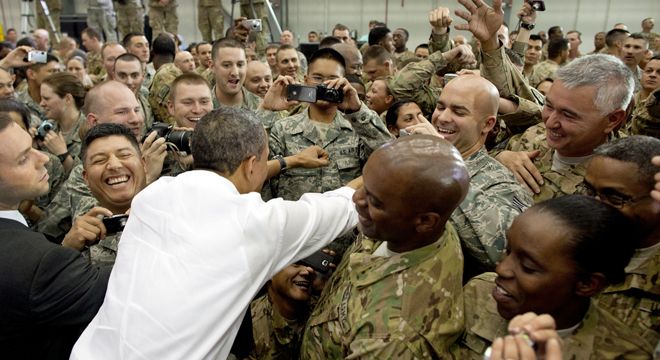President Obama is aggressively courting the veteran vote this year, counting on a combination of military victories and targeted programs to eat into what has long been considered a staunchly conservative voting bloc.
While not a campaign event, Obama’s visit to Afghanistan provided him a major opportunity to reach out to the military community, which he used to thank troops at Bagram Air Force Base and call on Americans to “give our veterans and military families the support they deserve, and the opportunities they have earned” in a nationally televised address.
Back stateside, Obama has embarked on a number of recent speeches, initiatives and campaign events specifically highlighting his work on veterans issues. He used a presidential weekly address last month to tout a new executive order aimed at protecting veterans from deceptive practices by for-profit colleges. Michelle Obama and Jill Biden toured the country to promote Joining Forces, an initiative aimed at helping military families cope while loved ones are abroad and encouraging businesses to hire returning veterans.
The military vote has become especially important in 2012 as a pair of previously solid-red states with large veteran communities, Virginia and North Carolina, have turned purple. Obama will kick off his re-election with a campaign rally in Virginia on Saturday.
Traditionally, Republicans have been thought to have a lock on all things military. But the environment may be changing as the overall veteran population becomes younger and less white. According to ABC’s exit poll, veterans made up 15 percent of 2008 voters and went for John McCain over Obama by only a 10-point margin, down significantly from Bush’s 16-point victory in 2004.
“Veterans and active duty are much more up for grabs than they’ve been in a long time,” Lt. Col. Jason Dempsey, an Army officer who has researched the political preferences of military members for years, told TPM.
For the first time in a while, nobody (so far) on the national ticket has served in the military or National Guard, something Dempsey has found to be an important factor in voting preferences. But he suspects the drawdown of the wars in Iraq and Afghanistan and the new emphasis on the economy may overshadow both candidates’ lack of a service record. Obama, though, is likely to benefit from the usual “commander in chief” effect that comes with presiding over the nation’s military — especially after successful operations killed Osama bin Laden in Pakistan and Anwar al-Awlaqi in Yemen.
Obama campaign officials, for their part, sound bullish about the prospect of winning the veteran vote, counting on Obama’s success in disrupting al Qaeda and ending the Iraq war to prove his foreign policy chops and his efforts to expand veteran programs among Washington’s recent budget battles to sell on the domestic side. They’ve devoted a section of their Operation Vote campaign — a set of grassroots outreach efforts tailored to individual groups like women, blacks, Jews and students — specifically to veterans and military families. And they’re eager to pick a fight with Romney on the issue.
“I fundamentally think we can [win the veteran vote],” Rob Diamond, veteran and military families vote director for the campaign, told TPM. “First and foremost because of the president’s foreign policy record and record of support for the veteran community. Second, because of the lack of any initiative coming out of the Romney campaign.”
The Obama campaign eagerly notes that Romney’s website has no veterans issues section, nor does his lengthy jobs white paper from the primary contain any mention of veterans-specific programs. The Obama team has also taken to publicly highlighting Romney’s short-lived suggestion that veterans care be privatized, which he walked back almost immediately after a backlash from veterans groups in November.
Romney’s campaign didn’t respond to requests for comment on his veterans outreach, but they too have been highlighting veterans in recent speeches and campaign materials. On Thursday, Romney said during a speech in Virginia that Obama is trying to trick the military with his campaign’s appeals.
“Virginians will not be fooled,” he said. “The president becomes a friend of the veterans and military every four years. You have seen the results of the last three and a half years and you do not want more of that. This is time for people in the military and people care about strength to stand up and vote for a change that puts someone in office that will keep America strong too.”
While Romney hasn’t proposed much in the way of veterans-specific programs, his campaign has attacked Obama over unemployment among Afghanistan and Iraq veterans, which is disproportionately high. But with no military experience of his own and a president happy to bully him on national security, he could face a tougher, more uncertain path compared with his Republican predecessors.






